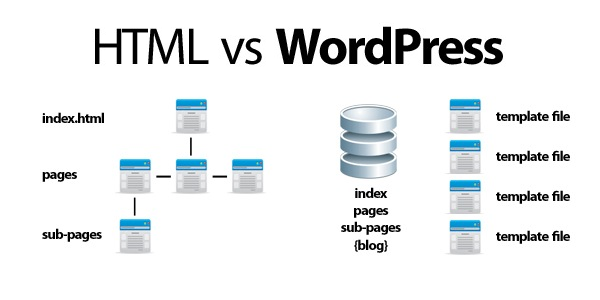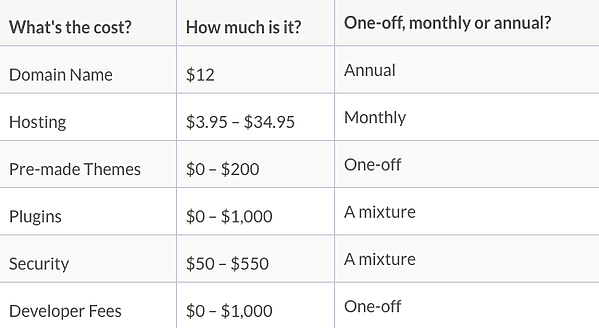A WordPress website is built using a content management system, while a coding website is created using programming languages and code. In today’s digital landscape, businesses and individuals have various options for building their websites.
This includes using platforms like WordPress, which offer user-friendly interfaces and pre-designed templates that can be customized to fit specific needs. On the other hand, coding websites require expertise in programming languages like HTML, CSS, and JavaScript to create and design the site from scratch.
While WordPress offers convenience and simplicity, coding websites provide more flexibility and control over design and functionality. The choice between the two depends on individual preferences, technical skills, and the desired outcome for the website.

Credit: zebratechies.com
WordPress Websites Unveiled
WordPress websites have become increasingly popular due to their user-friendly interface and customizable features. Let’s delve into the key differences between WordPress websites and coding websites, focusing on the ease of use with pre-built themes, the role of plugins for functionality, and the community support and resources available.
Ease Of Use With Pre-built Themes
One of the major advantages of WordPress is the availability of pre-built themes, allowing users to create a professional-looking website without the need for extensive coding knowledge. These themes offer a range of design options and layouts, catering to various industries and preferences. The user-friendly interface enables individuals with minimal technical expertise to customize their websites effortlessly, making it an ideal choice for beginners and small businesses.
The Role Of Plugins For Functionality
Plugins play a pivotal role in enhancing the functionality of WordPress websites. These add-ons offer a wide array of features, such as contact forms, SEO optimization, e-commerce capabilities, and security enhancements. With over 58,000 plugins available in the WordPress repository, users can easily integrate desired functionalities into their websites without delving into complex coding processes, thereby saving time and resources while maintaining optimal performance.
Community Support And Resources
WordPress boasts a vibrant community that provides extensive support and resources for users. From forums and online tutorials to local meetups and WordCamps, individuals can seek assistance, exchange ideas, and stay updated on the latest trends in website development. The abundance of documentation, forums, and community-generated resources fosters a collaborative environment, empowering users to troubleshoot issues, gain insights, and continually improve their WordPress experience.

Credit: www.educba.com
Diving Into Coded Websites
A coded website is built from scratch using programming languages, while a WordPress website is built using pre-designed templates and plugins. The main difference is flexibility and customization – coded websites offer more control and unique design options, while WordPress websites are easier to set up and manage.
Flexibility In Design And Development
Coded websites are designed from scratch and offer a higher level of flexibility when it comes to design and development. Unlike WordPress websites, which rely on pre-built templates and themes, coded websites allow for complete customization of every aspect of the website. This means that designers and developers can create unique and personalized websites that are tailored to the specific needs of the client. Additionally, coded websites offer the ability to create custom features and functionalities that may not be available on pre-built platforms.Performance And Optimization
One of the biggest advantages of coded websites is their performance and optimization. Since these websites are built from scratch, they are optimized for speed and performance. This means that they load faster, have better SEO rankings, and are more secure compared to WordPress websites. Additionally, coded websites can be optimized for specific devices and platforms, ensuring that users have the best possible experience regardless of how they access the website.Learning Curve And Expertise Required
While coded websites offer a higher level of flexibility and performance, they do require a certain level of expertise to design and develop. Designers and developers who work on coded websites need to have a deep understanding of programming languages such as HTML, CSS, and JavaScript. This means that the learning curve for creating coded websites is steeper compared to using pre-built platforms like WordPress. However, with the right skills and expertise, designers and developers can create highly customized and optimized websites that meet the specific needs of their clients. In conclusion, coded websites offer a higher level of flexibility, performance, and customization compared to WordPress websites. However, they require a certain level of expertise and knowledge of programming languages. Designers and developers who specialize in creating coded websites can offer their clients unique and personalized websites that are optimized for speed, performance, and user experience.Comparing Maintenance And Scalability
Maintaining and scaling a website are two important factors to consider when choosing between WordPress and a coded website. WordPress offers easy maintenance but may lack scalability, while coding allows for more scalability but requires more maintenance.
Updating And Security
Updating and security are crucial aspects of maintaining a website, regardless of whether it is built on WordPress or through coding. However, there are some notable differences between the two when it comes to managing updates and ensuring security.WordPress Website
WordPress websites offer a user-friendly interface that allows non-technical individuals to easily update their website content. With regular updates released by the WordPress team, users can benefit from new features, bug fixes, and enhanced security measures. Updating a WordPress website typically involves a few clicks, making it accessible even for beginners. In terms of security, WordPress takes security seriously by providing regular security updates. Additionally, there are numerous security plugins available that can further enhance website protection. These plugins offer features like malware scanning, firewall protection, and login security measures.Coding Website
On the other hand, coding a website from scratch requires a higher level of technical knowledge. Updating a coding website involves making changes directly to the codebase, which can be time-consuming and requires coding expertise. Each update must be carefully implemented and tested to ensure the website functions properly. In terms of security, coding websites are not as straightforward as WordPress websites. While security measures can be implemented through coding, it requires a deep understanding of web security practices. Regular security audits and updates are necessary to protect the website from potential vulnerabilities.Scaling Your Online Presence
Scaling your online presence refers to the ability of your website to handle increasing traffic and accommodate future growth. It is essential to consider scalability when choosing between a WordPress website and a coding website.WordPress Website
WordPress websites are designed to be highly scalable. They offer a range of plugins and themes that allow you to easily add functionality and customize your website as your needs evolve. With the vast WordPress community, finding solutions for scaling your website is relatively straightforward. Furthermore, WordPress websites are built on a content management system (CMS) that is optimized for handling large amounts of content. This makes it easier to scale your website by adding more pages, blog posts, and media without sacrificing performance.Coding Website
Coding websites provide more flexibility in terms of scalability. Since they are built from scratch, you have complete control over the architecture and infrastructure of your website. This allows you to optimize the website for scalability from the ground up. However, scaling a coding website requires technical expertise and careful planning. As the website grows, you may need to refactor the codebase, optimize database queries, and implement caching mechanisms to ensure optimal performance.Long-term Management Considerations
When considering the long-term management of your website, there are important factors to consider for both WordPress websites and coding websites.WordPress Website
WordPress websites offer a user-friendly interface that simplifies content management, making it easier for non-technical users to maintain their website in the long run. The availability of plugins and themes also ensures that you can easily update and enhance your website as needed. However, as your website grows, you may encounter performance limitations due to the resource-intensive nature of WordPress. In such cases, you may need to optimize your website or consider a more scalable solution.Coding Website
Coding websites provide more control and flexibility for long-term management. You have the freedom to customize and optimize your website to meet your specific requirements. However, this requires ongoing technical expertise and maintenance. Additionally, as technology evolves, you may need to update your website’s codebase to ensure compatibility with new standards and best practices. This can be time-consuming and may require the assistance of a developer. In conclusion, when comparing maintenance and scalability between WordPress websites and coding websites, it is important to consider the ease of updates and security, the ability to scale your online presence, and the long-term management considerations. Both options have their advantages and disadvantages, so it’s crucial to choose the one that best aligns with your specific needs and resources.Cost Implications And Time Investment
When it comes to building a website, considering the cost implications and time investment is crucial. In this section, we will explore the differences between a WordPress website and a coding website in terms of initial setup and ongoing expenses, time-to-market for your project, and the cost-benefit analysis over time.
Initial Setup And Ongoing Expenses
The initial setup of a WordPress website is relatively quick and straightforward. With a vast library of pre-designed templates and plugins available, you can easily create a professional-looking website without any coding knowledge. The cost of setting up a basic WordPress website is minimal, as you only need to pay for a domain name and hosting.
On the other hand, building a coding website requires advanced coding skills and expertise. You will need to write custom code from scratch or use a framework like HTML, CSS, and JavaScript. This process can be time-consuming, especially if you are not familiar with coding languages. Additionally, hiring a professional developer can significantly increase the initial setup costs.
When it comes to ongoing expenses, WordPress websites may require additional investments in premium themes and plugins for advanced functionality. However, these expenses are often optional, and you can find many free alternatives. On the other hand, coding websites may require regular updates and maintenance, which can also incur additional costs.
Time-to-market For Your Project
If you are looking to launch your website quickly, WordPress is the ideal choice. With its user-friendly interface and ready-to-use templates, you can have a functional website up and running within a few hours. This rapid time-to-market is perfect for small businesses or individuals who need an online presence without investing too much time and effort.
On the contrary, coding a website from scratch requires a significant amount of time and expertise. The development process involves writing code, testing, and debugging, which can be time-consuming. Moreover, if you encounter any issues, troubleshooting and fixing them can further delay the launch of your website.
Cost-benefit Analysis Over Time
In terms of long-term cost-benefit analysis, WordPress websites offer cost-effective solutions. As mentioned earlier, you can find many free themes and plugins that cater to your website’s needs. Moreover, WordPress regularly releases updates and security patches to ensure your website remains safe and functional. The availability of a vast community of developers and support forums also adds value to the WordPress ecosystem.
On the other hand, coding websites may require ongoing investments in hiring developers or outsourcing maintenance tasks. Additionally, as technology evolves, your coding website may become outdated and require extensive modifications or a complete rebuild to adapt to the latest trends and standards. This can result in significant costs over time.
In conclusion, while both WordPress websites and coding websites have their own advantages and disadvantages, understanding the cost implications and time investment is crucial. Consider your budget, timeline, and long-term goals to make an informed decision that aligns with your needs.

Credit: blog.hubspot.com
Frequently Asked Questions
Is It Better To Code A Website Or Use WordPress?
It depends on your needs. Coding a website offers more flexibility and customization, while WordPress is easier to use and has a wide range of plugins and themes available. Consider your technical skills, time, and budget before deciding.
What Is The Difference Between WordPress And Web Programming?
WordPress is a content management system (CMS) that allows you to build websites without coding. Web programming involves writing code to create custom websites with unique functionalities.
What Is The Difference Between A Website And A WordPress Site?
A website is a collection of web pages hosted on a domain, while a WordPress site is a type of website that uses the WordPress content management system to create and manage its content. WordPress is a popular and user-friendly platform that offers a range of customization options.
Can WordPress Replace Coding?
Yes, WordPress can replace coding for creating websites using its themes, plugins, and customization options.
Conclusion
The choice between a WordPress website and a coding website depends on your specific needs. Both options have their advantages and drawbacks, so it’s essential to consider factors such as technical expertise, flexibility, and scalability. Understanding the differences will help you make an informed decision for your website.


